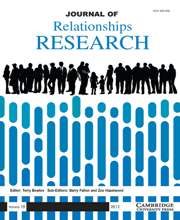Article contents
Associations of Parental and Peer Rejection With Preadolescents’ Loneliness: Emotional Sensitivities as Mediators
Published online by Cambridge University Press: 14 August 2014
Abstract
The pervasive emotional and cognitive experience of loneliness has been linked to rejection experiences and emotional sensitivity, such as rejection sensitivity (RS), defined as the tendency to anxiously expect and overreact to rejection. Moreover, RS is founded on attachment theory and has been described as a correlate of anxiety and avoidance of intimacy in close relationships. The aims of this study of 639 preadolescents (Grades 5 to 7) were to test whether the association between relationship stressors and loneliness is indirect due to the mediational role of RS, and whether the association between RS and loneliness is indirect via anxiety and avoidance of peer intimacy. As expected, regression results showed that adolescents who reported heightened perceptions of parental rejection and victimisation by peers had greater RS, which in turn was associated with adolescents’ greater feelings of loneliness. Also, as predicted, adolescents with heightened RS reported more avoidance and anxiety about peer intimacy. Although anxiety about intimacy mediated the association between RS and loneliness for both boys and girls, avoidance mediated between girls’, but not boys’, RS and loneliness. The findings highlight the interrelations between multiple forms of emotional sensitivities, and the importance of parent-child relationships, peer victimisation, and emotional sensitivity for explaining loneliness.
- Type
- Research Article
- Information
- Copyright
- Copyright © The Author(s), published by Cambridge University Press on behalf of Australian Academic Press Pty Ltd 2014
References
- 8
- Cited by


